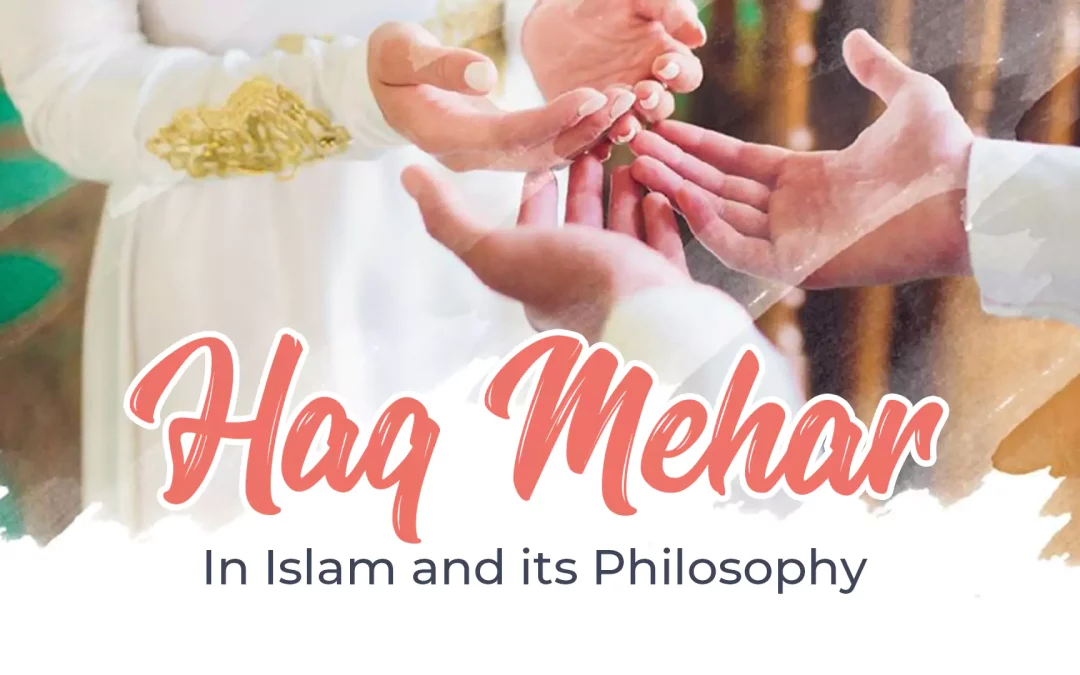In Islam, wedding customs are incredibly beautiful, focusing mainly on two events: Nikkah and the Walima or reception. Similar to how sweets and desserts are essential at weddings, there exists a vital prerequisite for finalizing the Nikkah known as Haq Mehar in Islam. This is the marriage gift that the groom gives to the bride. It’s not just a tradition; it’s a sacred command and a fundamental part of Nikah.
The importance of Haq Mehar in Islam holds significant value, yet it frequently goes unnoticed in our society. Haq Mehar is more than just a financial duty. It’s a way to show respect, love, and fairness in marriage. This idea goes beyond money, getting into the deeper thoughts that guide marriage. It’s like a promise from the groom to take care of his bride and honor her. This fits with the Islamic teachings about working together and understanding each other in a marriage. The philosophy of Haq Mehar reflects a balanced approach that Islam suggests for husbands and wives, valuing not only things you can touch but also feelings and understanding.
Even though it’s a vital financial responsibility in marriage, many people aren’t aware of its significance, and girls rarely ask for it. Today, our topic is the Haq Mehar in Islam and its underlying philosophy. Stick around until the end to discover why it matters and the wisdom that it holds.
What is Haq mehar in Islam?
Islam has granted a number of privileges to individuals of both genders. Even more so when they are starting to enjoy a loving relationship. Haq Mehar is one of the most important rights of a wife. Husband gives his wife Haq mehar after Nikkah.
Haq mehr is a wedding present that a husband gives to his wife. Islam states that the groom shouldn’t be under any pressure to choose the Haq Mehr.
Haq Mehar’s philosophy opposes placing undue burdens on others. Furthermore, no one is exempt from having to pay the more. The inclusion of Haq mehar in Islam stands for a foundation that encourages love and respect. In an Islamic marriage contract, it is mandatory to write Haq Mehar on Nikkah Nama.
Haq Mehar in Islam is a sum of money, jewellery, or other property that a husband promises to give to his wife in exchange for their union. He may give Haq mehar on the wedding day or at a later time.
How many types of Haq mehr are in Islam?
Haq Mehr in Islam has two types. Depending on the method of payment, there are two types: muajjal, or quick, and muwajjal, or delayed.
The muajjal mahr is given to the bride at a spot while muwajjal mahr can be delayed.
However, delaying the payment unduly is against the contract Nikkah.
The one point here is to know that Islamic law or Sharia has not established or even recommended any amount that could be referred to as Shari’a Mehr.
What is the philosophy behind Haq Mehar in Islam?
Islamic religious scholars has explained differently the wisdom and philosophy behind Haq Mehr. But a few important points in understanding the philosophy of Haq Mehr in Islam are as under:
- Haq mehar in Islam is the amount of money or gold gifted by the husband to his wife to show his sincerity, affection, acclaim, and willingness in retaining her heart; on the occasion of marriage. The Qur’an also expresses mehr as a Sadaq and introduces it as Nihlah, which means a gift or endowment.
- The religion of Islam grants males the freedom to divorce and polygamy, and the concept of Mahr strengthens a wife’s bargaining power in her marital contract.
- Haq mehr can play the role of protection for a woman against abuse and divorce. By fixing a mehr, a man who has the intention of playing abuse carries a financial loss upon himself.
- The Haq Mehr is an instrument of assurance and backup for marriage. The Mehr is the right and protection of the woman so she had an amount of money in case of emergencies.
- The Mehr is a token of instalment and commitment a man shows regarding his responsibility.
- The Mehr elevates the honour and position of a woman. As a women pay for dowry. Comparatively, a man had to pay for Mehr.
Who decides Haq Mehar?
Islam has not given any fixed amount of Haq mehr. So, the bride’s family decide the Haq Mehr. The groom bargains if the amount is too much but both parties should agree before proceeding to Nikkah.
The Haq Mehr has no bound but it doesn’t mean you can fix such amount that you are unable to pay. If Haq mehar is used as a guarantee, the amount should be one that the groom can afford.
In some scenes, we have seen the parents of the bride, to show their devotion, agree on the least amount of Haq mehr. Which is wrong.
The Mehr must be sufficient to allow a bride to defend her marriage in trying circumstances. The minimum quantity of Mehr should be ten dirhams or US dollars and no one should accept Mehr less than 30 grams of silver.
Is there anyone who can avoid giving Haq Mehar?
In Nikkah, Haq Mehr is a requirement, and everyone must pay it. The Haq mehr can’t be forgiven against the bride’s will. If a man dies without giving Mehr to his spouse, then his heirs are under the debt of it and are obliged to pay it.
Mehr is a liability to the husband and is said to have paid it as soon as possible.
Haq Mehar in Islam is the most important requirement during Nikkah. It is the privilege of the bride which should be given to her and she also has the right to keep it with her even if she gets a divorce.
Women should use their right to Haq Mehr and demand it. Leaving it by their own will is acceptable but doing it under the pressure of in-laws or relatives is a ruthlessness to the soul.
So, this was all from today’s blog post. We hope that this post was informative for you. And after reading the blog, you can find out;
- What are the types and limit of Haq mehar in Islam?
- What is the importance of Haq Mehar in Islam?
Check our website for more blogs and subtle proposals. The service is currently free.


We should give love, care, respect and rights as a Haq mehar.
God bless you writer!
This sentence truly resonates with me.
“The philosophy of Haq Mehar reflects a balanced approach that Islam suggests for husbands and wives, valuing not only things you can touch but also feelings and understanding.”
This perspective is quite unique, as not many share this view. Typically, grooms tend to view Haq Mehar as a cumbersome obligation.
It’s an awesome post in favor of all the website visitors; they will take advantage from it I am sure.